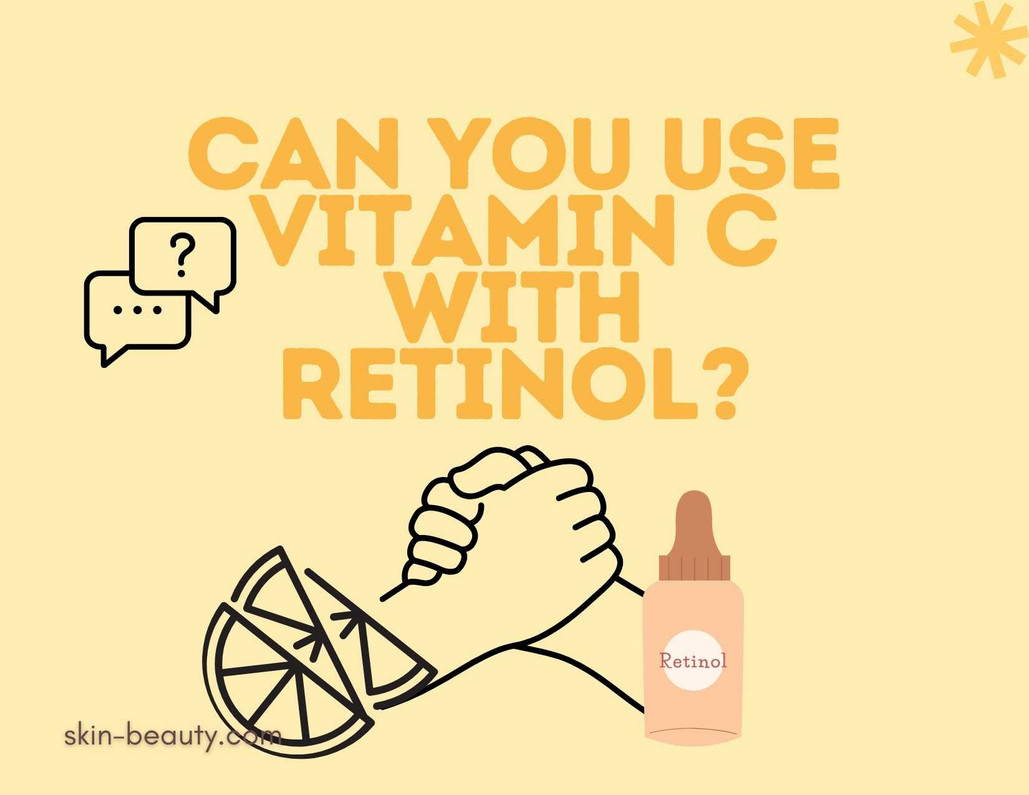Can You Use Vitamin C with Retinol?
Can You Use Vitamin C with Retinol? Discover the Expert's Verdict
Are you tired of trying numerous skincare products to combat signs of aging and improve your complexion? Look no further! The dynamic duo of retinol and vitamin C might be your ultimate solution. In this blog post, we’ll unveil the benefits of these powerful ingredients, discuss their compatibility, and answer the question, “can you use vitamin C with retinol?” We will also guide you on how to use them effectively in your skincare routine for radiant, youthful skin.
Key Takeaways
- Retinol and vitamin C are powerful anti-aging ingredients that can improve skin texture, reduce acne, and protect from environmental stressors.
- Combining retinol and vitamin C is safe when balanced with pH levels. Invest in trusted brands for optimal results.
- Gradual introduction of these products into your skincare routine will help achieve a more youthful complexion while reducing irritation.
Understanding Retinol and Vitamin C
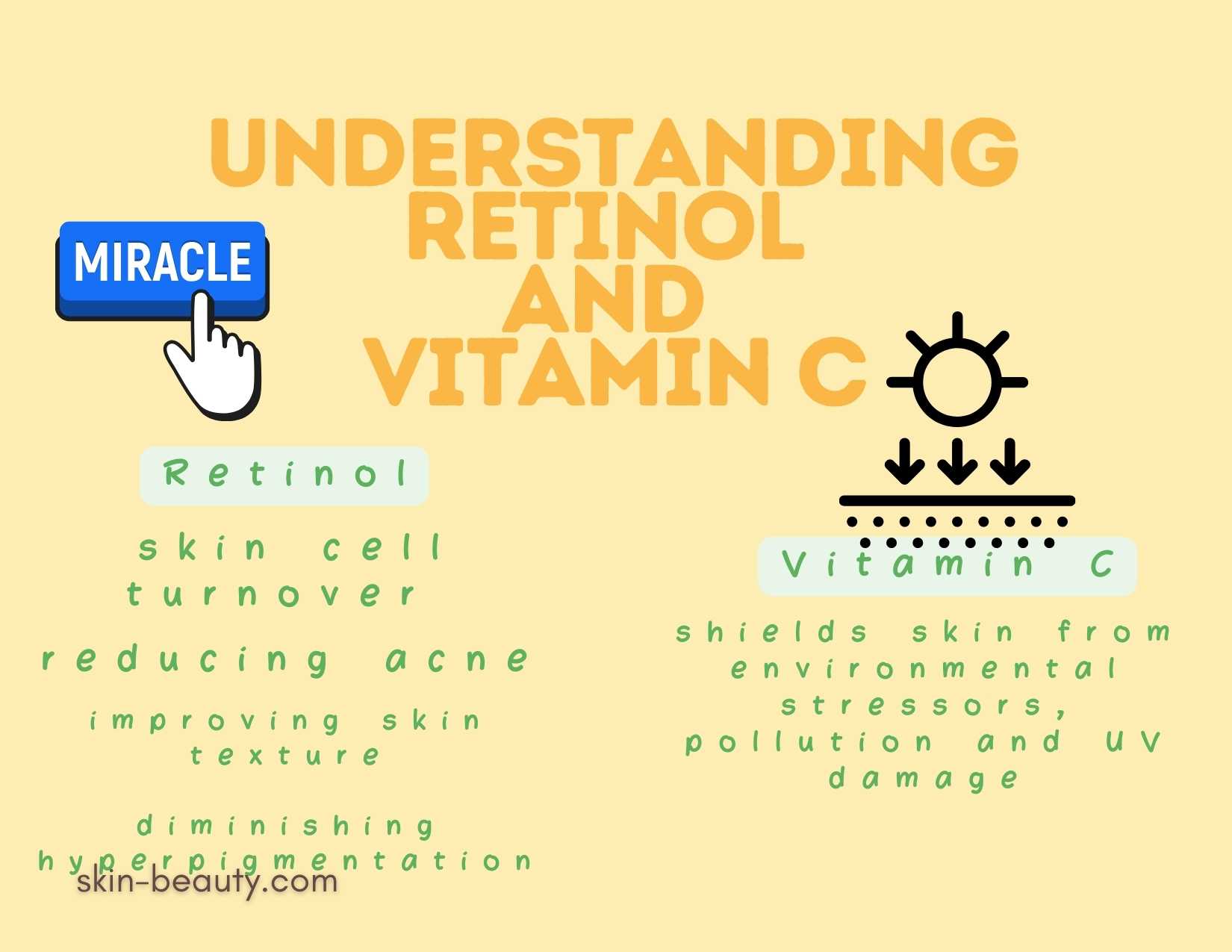
Retinol and vitamin C are two skincare superstars that have taken the beauty world by storm. But what makes these ingredients so special? Retinol, a derivative of vitamin A, is a powerhouse in the skincare industry due to its ability to combat signs of aging by promoting skin cell turnover and collagen production.
On the other hand, vitamin C, a potent antioxidant, protects your skin from environmental stressors and helps even out your skin tone. When incorporated into your skincare routine, both retinol and vitamin C can work together to enhance your skin’s appearance, addressing concerns like:
- fine lines
- wrinkles
- dullness
- dark spots
Retinol: The Powerhouse of Skincare
Retinol, often considered a “miracle worker” in the skincare world, offers numerous benefits for your skin. It’s known for promoting skin cell turnover, which helps reveal a radiant, youthful complexion hiding beneath the surface. Retinol is also effective in reducing acne, improving skin texture, and diminishing hyperpigmentation, making it an excellent choice for those struggling with acne-prone skin and uneven skin tone.
Adding retinol to your nighttime routine aids skin repair and regeneration during sleep. However, remember to shield your skin from the sun during daytime as retinol can heighten your skin’s sensitivity to detrimental UV rays. With consistent use, retinol can significantly improve your skin’s health and appearance, making it a must-have ingredient in your daily skincare regimen.
Vitamin C: The Antioxidant Booster
Both Vitamin C and collagen production are essential for maintaining skin health. Vitamin C is a skincare hero that boasts a multitude of benefits for your skin. It:
- Shields your skin from environmental stressors, such as pollution and UV damage
- Enhances your skin’s natural regeneration process
- Is particularly effective in fighting discoloration
- Supports collagen production, resulting in brighter, healthier skin.
For optimal benefits from vitamin C, follow these steps:
- Choose a serum with a concentration of 10-20%.
- Use it in the morning.
- Seal it with a moisturizer and SPF to guard your skin against the sun’s damaging rays.
- With consistent use, you’ll notice an improvement in your skin tone, texture, and overall radiance, making vitamin C an indispensable part of your morning skincare routine.
Combining Retinol and Vitamin C: Is It Safe?
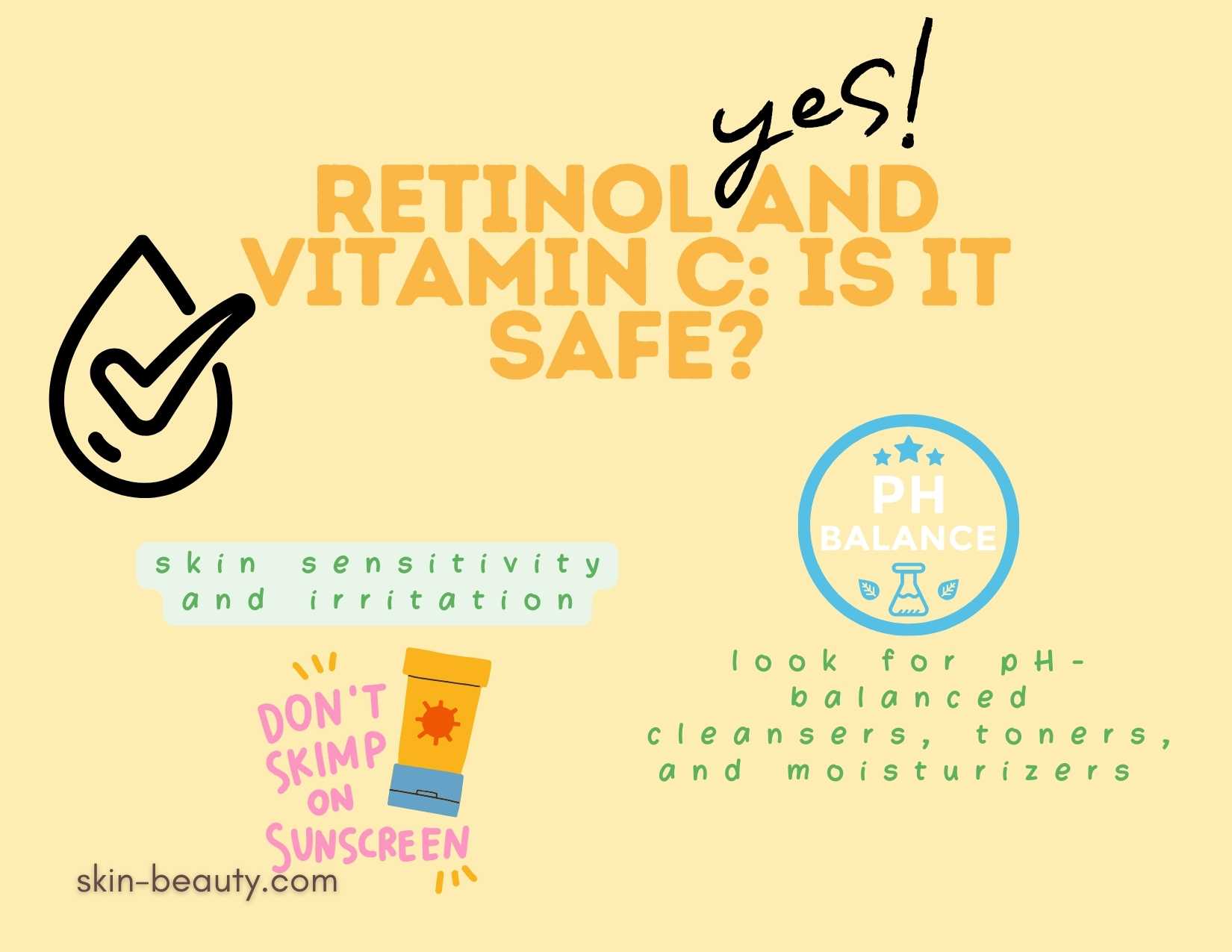
Now, you might be wondering if it’s safe to combine retinol and vitamin C in your skincare routine. The answer is yes! These two ingredients can work together to provide even more impressive results. However, it’s important to be cautious when introducing them into your routine, as combining them can potentially cause skin irritation and sensitivity in some individuals.
Balancing the pH levels of both ingredients is key to mitigating any possible irritation. Retinol works best at a higher pH level (around 5.0 to 6), while vitamin C needs a lower, more acidic pH level (3.5 or lower) to be effective. By carefully selecting and applying your products, you can ensure that both retinol and vitamin C work optimally without interfering with each other’s pH requirements.
Skin Sensitivity and Irritation
While combining retinol and vitamin C can produce amazing results, be aware of your skin’s response when you start using these potent ingredients. Skin sensitivity and irritation can occur, especially for those with sensitive skin or those who are new to using retinol and vitamin C.
To reduce the risk of skin irritation, start with a low concentration of both ingredients and gradually increase the concentrations as your skin adjusts. Make sure to moisturize and use sunscreen during the day to further protect your skin and alleviate any irritation. By following these precautions, you can safely incorporate retinol and vitamin C into your skincare routine and enjoy their incredible benefits.
Balancing pH Levels
As previously stated, retinol and vitamin C operate best at different pH levels. But fret not! There are ways to ensure that their pH levels are balanced when using them together. Applying vitamin C first, followed by retinol, allows both ingredients to work optimally without interfering with each other’s pH requirements.
Moreover, there are pH-balanced cleansers, toners, and moisturizers available that can help keep the pH levels balanced, making the combination of retinol and vitamin C even more effective. Look for products specifically formulated to address the pH needs of both ingredients for the best results.
How to Use Retinol and Vitamin C in Your Skincare Routine
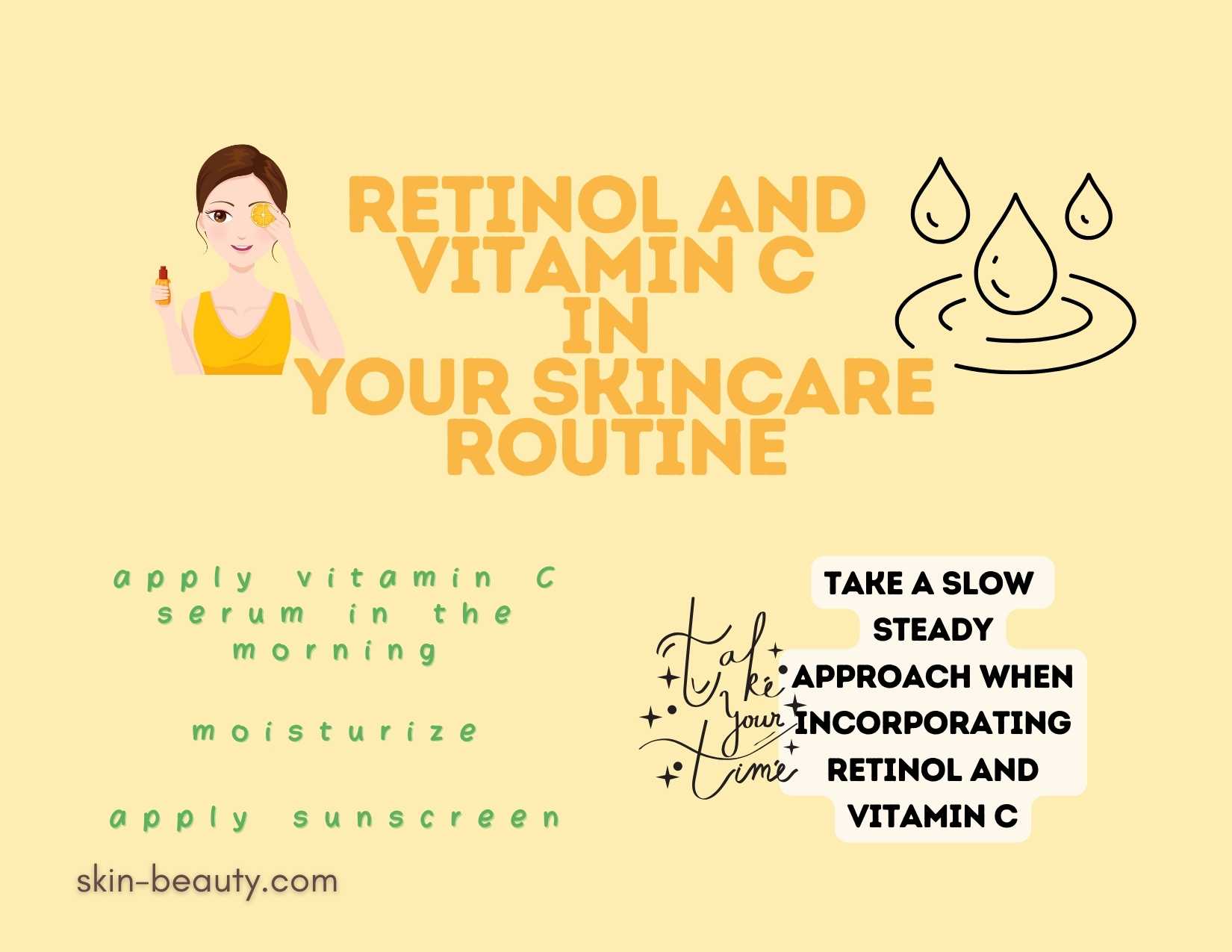
Having confirmed that the combination of retinol and vitamin C is safe, we can now explore the best ways to effectively incorporate them into your skincare routine. Expert dermatologists recommend introducing retinol and vitamin C gradually to help your skin adjust to the new ingredients and maximize their benefits while minimizing potential irritation.
Remember, applying vitamin C in the morning and retinol in the evening can help reduce the risk of irritation and ensure that both ingredients work their magic on your skin. By following these expert tips, you’ll be well on your way to achieving a more radiant, youthful complexion and preventing premature skin aging.
Morning vs. Evening Application
Optimizing the timing of your retinol and vitamin C application is crucial for maximizing their benefits. As a general rule of thumb:
- Apply your vitamin C serum in the morning to protect your skin from environmental stressors, including sun exposure, throughout the day.
- After applying the serum, follow up with a moisturizer tailored to your skin type.
- Apply a broad-spectrum sunscreen with SPF 30 or higher to shield your skin from the sun’s harmful rays.
In the evening, apply retinol to take advantage of its reparative properties during your skin’s natural regeneration process while you sleep. By following this morning and evening application routine, you can ensure that both retinol and vitamin C work effectively without causing irritation or compromising their efficacy.
Gradual Introduction of Ingredients
It’s important to take a slow and steady approach when incorporating retinol and vitamin C in your skincare routine, allowing your skin ample time to adapt. Here’s how to do it:
- Begin by incorporating one ingredient at a time, starting with retinol in the evening.
- Use a small amount of retinol and apply it to clean, dry skin.
- Gradually introduce vitamin C to your morning routine a few weeks later.
- Start with a low concentration of vitamin C and apply it after cleansing and toning.
- Use sunscreen during the day to protect your skin from sun damage.
This gradual introduction helps reduce the risk of irritation and allows your skin to build tolerance to these powerful ingredients.
Start with a lower concentration of both retinol and vitamin C and gradually increase the concentration as your skin adjusts. This approach not only minimizes the risk of irritation but also ensures that your skin reaps the maximum benefits of both ingredients, leaving you with a radiant, youthful complexion.
Choosing the Right Retinol and Vitamin C Products
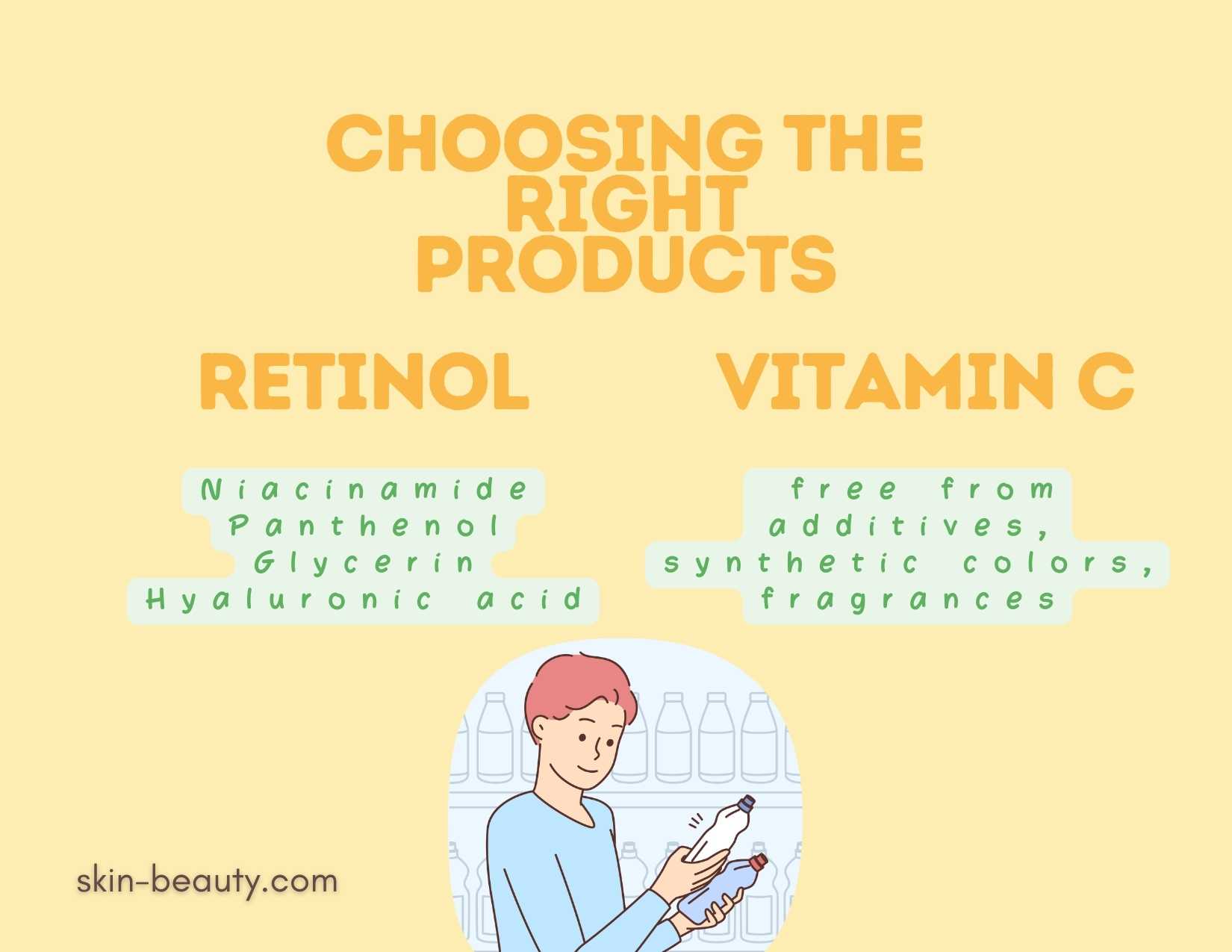
Choosing suitable retinol and vitamin C products is pivotal to attain the best results. Dermatologists recommend investing in high-quality, tested, and reviewed brands and formulations to ensure that the products are safe and effective. In addition to choosing reputable brands, it’s also important to pay attention to the ingredients, concentration, and packaging of the products.
By selecting products with complementary ingredients, such as hydrating and nourishing components in retinol products and a concentration of 10-20% in vitamin C serums, you can maximize their benefits and minimize potential irritation. With the right products in hand, you’ll be well on your way to achieving a more radiant, youthful complexion.
Key Ingredients to Look For
It’s vital to focus on key ingredients when shopping for retinol and vitamin C products, as these can amplify their effectiveness and confer extra benefits to your skin.
For retinol products, opt for formulations that include hydrating ingredients like:
- Niacinamide
- Panthenol
- Glycerin
- Hyaluronic acid
This will ensure your skin stays moisturized while using retinol.
For vitamin C serums, choose formulations with a concentration between 10-20% for maximum effectiveness and visible results. Additionally, it’s beneficial to select products that are free from additives, synthetic colors, and fragrances to minimize the risk of skin irritation and potential harm. By choosing products with the right ingredients, your skin will thank you for the enhanced benefits and reduced irritation.
Trusted Brands and Formulations
Putting your money on trusted brands and formulations is of utmost importance for retinol and vitamin C products. Renowned brands like:
- Neutrogena
- Kate Somerville
- Eau Thermale Avène
- Lancer Skincare
- LilyAna Naturals
- RoC
- SkinCeuticals
- Drunk Elephant
XYZ Company is highly regarded for their superior retinol and vitamin C products, featuring l ascorbic acid as a key ingredient, beneficial for skin cells.
When selecting a product, consider factors such as:
- concentration
- stability
- ingredients
- your skin type and concerns
By investing in high-quality, tested, and reviewed brands and formulations, you can ensure the safety and effectiveness of your retinol and vitamin C products, paving the way for a more radiant, youthful complexion.
Addressing Common Skin Concerns with Retinol and Vitamin C
The combination of retinol and vitamin C in your skincare regimen can tackle a range of common skin issues like fine lines, wrinkles, dullness, and hyperpigmentation, all of which contribute to skin aging. These powerful ingredients work together to improve your skin’s texture and tone, reduce fine lines, lighten dark spots, and brighten dull skin.
In addition to their individual benefits, the combined use of retinol and vitamin C can also help prevent and treat acne and acne scars, as well as reverse signs of aging. With consistent use, you’ll see a significant improvement in your skin’s appearance, making retinol and vitamin C a winning combination for tackling common skin concerns.
Summary
In conclusion, retinol and vitamin C are skincare superheroes that, when combined, can work wonders for your skin. By carefully selecting and incorporating these ingredients into your skincare routine, you can effectively address common skin concerns such as fine lines, wrinkles, dullness, and hyperpigmentation. Remember to gradually introduce the ingredients, apply them at the right time of day, and choose high-quality products from trusted brands. With these expert tips in mind, you’ll be well on your way to achieving a radiant, youthful complexion that will have others wondering about your skincare secrets.
Frequently Asked Questions
Do you put vitamin C on before or after retinol?
Applying Vitamin C first is the recommended way to go since it is water-soluble and has a lower pH than retinol. Once the Vitamin C has been absorbed into the skin for 30 minutes, your skin's pH level will return to normal so that the Vitamin C doesn't interfere with the effect of the retinol.
Why should you not mix retinol and vitamin C?
Using Retinol and Vitamin C together can cause skin irritation due to the active nature of both ingredients. It's best to use Retinol at night and Vitamin C during the day to achieve great skin results without causing any harm.
How to use hyaluronic acid?
For optimal results, apply hyaluronic acid serum to a damp face after cleansing and toning. Rub it in gently and wait a moment for it to absorb. Then seal in the moisture by adding a moisturizer. Enjoy the benefits of hydrated, plump skin!
How can I minimize skin irritation when using retinol and vitamin C together?
Gradually introduce retinol and vitamin C into your skincare routine, starting with low concentrations and increasing as your skin adjusts, to minimize skin irritation.
Which ingredients should I look for in retinol and vitamin C products?
For the best results, look for retinol products with hydrating ingredients such as niacinamide and glycerin, and vitamin C serums with a concentration of 10-20%.
Recent Posts
-
Peptides For Skin: Exploring the Anti-Aging Benefits of Peptides in Skincare
Exploring the Anti-Aging Benefits of Peptides in Skincare In the universe of advanced skincare, th …Apr 25th 2024 -
Discover the Perfect Glasses & Styles to Enhance Your Rectangle Face Shape!
Your face shape plays a significant role in determining the most flattering hairstyles and makeup te …Apr 17th 2024 -
Moroccanoil Treatment for Hair: The Ultimate Guide
Moroccanoil Treatment for Hair: The Ultimate Guide In the world of hair care, few products have ca …Apr 1st 2024

